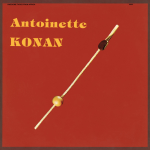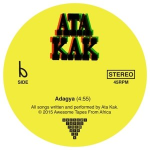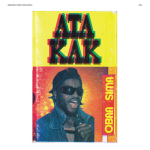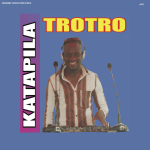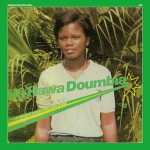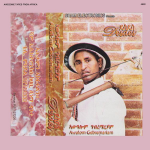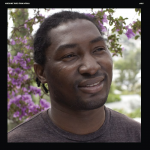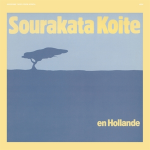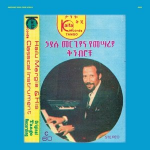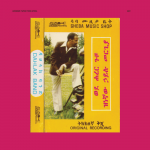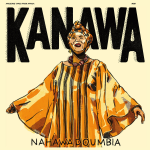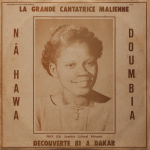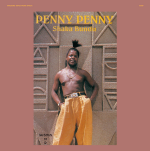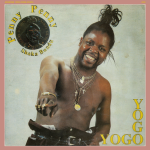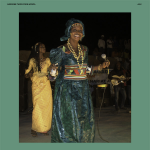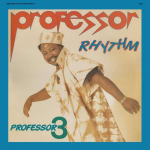Labels
Awesome Tapes From Africa
- 01. Kokoloko Tani
02. M'ackô
03. Enfants Du Monde (Version Baoulé)
04. Abidjan Adja
05. Evignen
06. YaléANTOINETTE KONAN
Antoinette Konan
[engl] The Queen of the Ahoko It makes sense that Antoinette Konan’s eponymous album features nothing more than her ahoko on the cover. The deceptively simple traditional percussion instrument transformed Ivory Coast’s Baoulé music scene when Konan deployed it against a roaring electrified backdrop of synth, bass guitar and drum machines. Released in 1986, the album is a veritable UFO of instrumental force and contemporary pop sensibility landing in a boiling pot of diverse, creative characters inhabiting Abidjan, Ivory Coast (Côte d’Ivoire). Known as the “Queen of the Ahoko” among Ivorians, Konan single-handedly put the central-Ivorian instrument on the map when she gave it a 20th-century re-introduction. The three-piece wooden idiophone is handmade from a thin, ribbed, flexible stick, against which a smaller chunk of wood is rhythmically scraped. A hollow nutshell held in the non-scraping hand amplifies and manipulates the resulting overtones. Despite the ahoko's diminutive appearance, Konan and her powerful voice have remained at the forefront of Ivorian music for decades now, in an extremely diverse country—approximately 70 indigenous languages—with a competitive, internationally-recognized music industry. Music plays an important role in Baoulé cultural life, heard and seen in festivities, funerals and more. They are the largest ethnic group in Côte d’Ivoire and descend from Akan peoples who migrated from present-day central Ghana. Baoulé vocal music is characterized by polyphony, melodies built on parallel thirds and call-and-response. All of this can be heard in Konan’s music. In 1976, she got her start with Ivory Coast’s National Television Orchestra (ORTI), backing major Ivorian stars on Podium, a program featuring youth culture hero Roger Fulgence Kassy. By 1980 she was playing in Musicaria, visionary Ivorian bandleader Boncana Maïga’s group. With Maïga, she expanded her creative horizons and learned new approaches. She also worked with influential producer Jimmy Hyacinthe’s band. His artistic agency in Treichville—Abidjan’s music industry epicenter at the time—further inspired Konan. She would hang out there after school. Konan had a difficult time balancing school and music but enrolled in a music program at INA (National Institute of Arts, where she later also taught classes) and was able to both travel for concerts overseas and study music. Meanwhile, she managed to work with some of Abidjan’s key arrangers and music-makers. Music manager Amedé Koko Tanoh, who was also involved in the agency where Konan socialized, provided the original impetus for her to learn the ahoko in 1981 as a way to distinguish herself from other artists. He took her to study with a professional ahoko player, an old woman who began to teach Konan. But she soon brushed the young lady off and wouldn’t teach her any more. Konan continued on her own until her mother asked where she got the instrument. It turned out her mother knew how to play also, so Konan began to study with her mom. She taped her mom’s ahoko playing so she could practice back at university. During this early period, Konan borrowed clothes because she could not afford performance attire. Despite some ridicule she persevered. Music impresario George Tahi Benson, one of her key mentors, told her, “It’s good to dress the way you do. But what if you instead make the difference by promoting the local cloth, the Baoulé cloth.” She again got some negative feedback when she changed to traditional gowns. But it became her trademark look and gradually became trendy among Ivorians all over the country. Konan’s fingerprints are all over Antoinette Konan, she says, as it was meant to be a highly personal recording. She wanted to portray the suffering, injustice, frustrations, humiliations, personal career struggles, experience of child birth and poverty she sees in society. Taking on the producer role for the first time, Konan was the architect of her dancefloor-ready neo-traditional sound. But crucial to the recording was arranger Bamba Moussa Yang. A creative and versatile musical mind who was known for his work with legendary Ivorian singer Ernesto Djedje, Konan met him in 1986 after she had already released two albums. Yang brought a touch that matched Konan’s expectations, she says, because he knew her work so well. As she reflects on her long career today, Konan remembers Yang as her favorite arranger. Over the years Konan’s popularity grew to the upper echelons of Ivorian society: Ivory Coast’s first president Felix Houphouet Boigny’s would regularly invite Konan to perform at official ceremonies with foreign dignitaries. Through her charity and advocacy work on behalf of female musicians, Konan is still a force in the country’s music community. You can see her performing or speaking on television and around the country all the time—yet she still maintains several entrepreneurial projects in the farming sector. Konan has recorded more than 15 albums so far and plans more recordings soon.- Format
- LP
- Release-Datum
- 22.11.2019
- EAN
- EAN 0843563120651
- 01. Obaa Sima
02. AdagyaATA KAK
Obaa Sima
Die zweite 12"-Single von ATA KAKs mittlerweile legendären Solokassette ,Obaa Sima". Nachdem das Tape im Frühjahr nach einer großangelegten Suche nach dem Musiker selbst endlich veröffentlicht wurde, hat die Musik unter Mithilfe von Awesome Tapes From Africa als CD und LP weltweit Freunde gefunden. Mit dieser limitierten 12"-Edition für DJs und andere Nerds sprechen die Songs ,Obaa Sima" und ,Adagya" eine Einladung zu tieferer Betrachtung aus. Die beiden über Toronto aus Ghana importierten Dance Tracks tanzen sich in Rage und klingen wie nichts, das man je gehört hat. ATA KAK baute sein eigenes Studio aus Second Hand Equipment auf und brachte sich selbst bei, wie man eine Platte produziert. Die 12" vereint ATA KAKs Idealbild der Frau, ,Obaa Sima" und die B-Seite ,Adagya", die hier auf eindrucksvolle Weise New Jack Swing, Rap und Scatting vereint, die von eine minimalen Keyboardmelodie und einem zeitlosen Sinn für Highlife Soul zusammengehalten werden. ATA KAK hat diese visionäre Aufnahme vor mehr als zwei Jahrzehnten aufgenommen, doch der freudige, ungekünstelte Geist des Albums war seinen Zeitgenossen viele Meilen voraus.- Format
- 12''
- Release-Datum
- 27.10.2015
- 01. Obaa Sima
02. Moma Yendodo
03. Adagya
04. Medofo
05. Daa Nyinaa
06. Yemmpa Aba
07. Bome NnwomATA KAK
Obaa Sima
Die Kassette mit dem Titel ,Obaa Sima" von ATA KAK stieß zunächst auf taube Ohren, als sie das erste Mal in Ghana und Kanada in Eigeninitiative und limitiert auf sehr wenige Exemplare veröffentlicht wurde. Die Musik auf der Aufnahme - ein Amalgam aus Highlife, bi-lingualem Rap, Funk und Disco - wird mit der Leidenschaft eines PRINCE-Albums und dem DIY-Charme der frühen House Music aus Chicago präsentiert. Das clevere Songwriting und die visionäre Mischung aus Geräuschen und Rhythmen macht dieses Album zu einer Left-Field-Kult-Veröffentlichung weltweit. Brian Shimkovitz, der Gründer von Awesome Tapes From Africa, entdeckte das Tape im Jahr 2002 in Ghana und stieß damit auf eines der wenigen hergestellten Exemplare. Es war dieses Tape, das ihn zur Gründung des Awesome Tapes From Africa-Blog inspirierte und das dort natürlich prominent erwähnt wurde. Es folgten Hunderttausende Downloads und Youtube Klicks sowie Tributes an die Musikvideos und Remixe. Das Mysterium um ATA KAK gipfelt nun in dieser Album-Veröffentlichung, inklusive seltener Fotos und der ganzen Hintergrundgeschichte eines der rätselhaftesten Musikers des digitalen Zeitalters.- Format
- LP
- Release-Datum
- 27.10.2015
01. Sakawa
02. Trotro
03. Cocoawra
04. Nkran Dokunu
05. Lalokat
06. Ice-Inc
07. Zoomlion
08. Sakawa
09. Trotro
10. CocoawraDJ KATAPILA
Trotro
DJ KATAPILA macht traditionelle Ga Musik, benutzt aber elektronische Sound statt Live Percussion und erschafft damit etwas ganz Eigenes, das er House Music nennt. Im Kontext der ghanaischen Popmusiklandschaft ist die Musik von KATAPILA einzigartig. Der schnelle, basslastige Sound aus dem Roland 808 bildet den frühen Techno des Detroits der Neunziger und Chicago Acid House ab, als die Hiplife Produktionen, die aktuell das ghanaische Radio fluten. Trotzdem lässt sich sein Sound direkt bis zur Ga Tradition aus der Gegend um Acccra zurückverfolgen. Die neotraditionellen Dance Formen Gome, Kpanlogo und Gyama sind deutlich identifizierbar. DJ KATAPILA begann erst im Alter von 39 Jahren damit, Musik zu produzierten. 1998 fing er an auf Ga und Twi zu rappen und zu singen, wenn sich in seinem DJ-Set Pausen ergaben. Er schaffte sich einen Drumcomputer und Sampler an und schrieb spontan neue Stücke. Darauf folgten dann Experimente mit Fruity Loops auf seinem Laptop. Seine Musik verrät seine Vorliebe für den internationalen Dance Pop, der in den neunziger Jahren in Arcca im Radio lief: INNER CITYs "Big Fun"; C&C MUSIC FACTORYs "Gonna Make You Sweat"; CRYSTAL WATERS' "Gypsy Woman" und sogar die Hits von RICK ASTLEY. KATAPILA vermischt internationale Songs mit Highlife, Hiplife, ghanaischem Gospel, jamaikanischem Dancehall, Soca und regionalen französischsprachigen Hits. Das ist die Basis für ,Totro" und die lebendige und doch minimalistische Dance Music, die KATAPILA sich nun zu Eigen macht.- Format
- LP
- Release-Datum
- 19.02.2016
- EAN
- EAN 0751937435716
- 01. Korô Dia (à Mamaye Dramé L'inoubliable)
02. Dan Té Dinyé La
03. Danaya (à Sidi Konaté Pour Toujours)
04. Kungo SogoniDOUMBIA, NA HAWA
TrotroLa Grande Cantatrice Malienne, Vol. 3
Doumbia "sings with the raspy edge of a traditional musician and the precision of someone who knows exactly what she's after," according to The New York Times. "La Grande Canatrice Malienne" was made in Abidjan, Ivory Coast in 1982, capturing the singular duality inherent in her music early on: a stripped-down, raw backdrop supported by warm sonics; feminist expressions of social issues imparted through stark refrains. The album is third in a series recorded in the early 80s near the beginning of the singer's nearly four decade career. Previously available as a long out-of-print vinyl import from Ivory Coast, The album's four songs are supported by a minimalist ensemble of guitar, piano, kamele ngoni and percussion.- Format
- LP
- Release-Datum
- 19.02.2016
- EAN
- EAN 0751937435716
- 01. Desdes
02. Tehhelo
03. Teumat Chena
04. Aadu
05. Eritreana
06. Salel
07. Segamaye
08. Malegaanya
09. Gwaal Haagaraye
10. Showite SigemGEBREMARIAM, AWALOM
Desdes
Nach einer langen Reise kam AWALOM GEBREMARIAM im Alter von 28 Jahren aus Eritrea in den Vereinigten Staaten von Amerika an. Er hatte es vor einigen Jahren in ein Flüchtlingscamp nach Äthiopien geschafft und schließlich die Asylerlaubnis für die USA bekommen. Bevor er jedoch seine Heimat in Eritrea, die Hauptstadt Asmara, verließ, nahm er seine erste und bisher einzige Platte auf. ,Desdes" wurde 2007 vollendet, nicht sehr lange, bevor er sich auf den Weg in die USA machte. Weil er unterwegs war, erhielt er niemals Geld für die Verkäufe seiner Kassetten und CDs. Und er erfuhr nicht, welchen Einfluss die Songs in seiner Heimat hatten. Während sich viele der Songs auf die Liebe zu konzentrieren scheinen, geht es jedoch nicht um die romantische Liebe an sich. Ein Großteil der Musik, die AWALOM als Jugendlicher hörte, war verbunden mit der schwierigen Unabhängigkeit von Eritrea von Äthiopien. AWALOM wartete jahrelang auf die Chance, den wirtschaftlichen und politischen Unsicherheiten zu entkommen. Mit jetzt 29 Jahren wohnt AWALOM in North Carolina, arbeitet in einem Restaurant und will seine Musik zu den eritreischen Landsleuten in den USA bringen, gleichzeitig jedoch neue Hörer erschließen.- Format
- DoLP
- Release-Datum
- 15.04.2016
- EAN
- EAN 0751937436119
- 01 Clipo Clipo
02. Katin
03. Kango
04. Minimanle?
05. Our Garden Needs Its Flowers
06. Apartheid
07. African Chant
08. SolutionJESS SAH BI & PETER ONE
Our Garden Needs Its Flowers
Erste offizielle internationale Veröffentlichung dieses grandiosen Albums. - Westafrikanische Country-Folkmusik mit Ambient Vibe. - Remastert und in Originalqualität . - Stadionfüllende Hymnen über Frieden und Einheit. - Für Fans von '70s Singer-Songwriter/AltCountry/Folk. Die Elfenbeinküste ist nicht für Country-Musik bekannt. Aber das 1985er Album ,Our Garden Needs Its Flowers" von Jess Sah Bi & Peter One wurde dort ein massiver regionaler Hit und brachte ein wachsendes Interesse an Folk und Americana in den Mainstream. Zwei junge Männer erlangten internationale Prominenz, die in stadionfüllenden Konzerten und Auftritten für die First Lady und andere Würdenträger der Elfenbeinküste gipfelte. Ihre Musik stand in krassem Gegensatz zu den populären afrikanischen Klängen der damaligen Zeit, die von rasanten regionalen Tanzmusikgenres über Ziglibithy bis hin zu Soukous und Straight-up-Funk reichten. Country-Musik und Folk-Rock waren beim Publikum nicht sehr beliebt. Kenny Rogers, Dolly Parton und Don Williams' Musik bekamen Airplay in einigen Radioprogrammen in den großen Städten der Elfenbeinküste und einige jüngere Leute hörten Simon & Garfunkel, Creedence Clearwater Revival, Cat Stevens und Crosby Stills & Nash. Jess Sah Bi & Peter One schufen heimische Country-Musik, um das Bewusstsein der Ivorer zu prägen. Mit Slide-Gitarre, hochfliegendem Gesang und hymnischen, politisch bewussten Texten in drei Sprachen wurde die Aufnahme allgegenwärtig im französischsprachigen Westafrika. "Wir hatten erwartet, dass das Album ein großer Erfolg wird, aber wir konnten uns nicht vorstellen, wie weit es gehen würde", sagt Peter. Nach der Veröffentlichung von ,Our Garden Needs Its Flowers" stieg die Popularität von Jess und Peter schnell an und führte zu Stadionauftritten in Togo, Burkina Faso und anderswo. Ihr Aufstieg wurde von der lokalen Presse und Fernsehsendungen, von Auftritten bei von der Frau des Präsidenten der Elfenbeinküste organisierten Galas, und sogar von einem Auftritt während des ECOWAS-Gipfels 1988 in Yamoussoukro begleitet. Jess und Peter's Lauf dauerte bis in die frühen 1990er Jahre und wurde von der BBC mit ihrem Song ,African Chant` als Titelmusik an dem Tag, an dem Nelson Mandela aus dem Gefängnis entlassen wurde, abgeschlossen. Jess und Peter leben jetzt in San Francisco bzw. Nashville und machen weiterhin selbstständig Musik. Pläne für die Wiedervereinigung des Duos sind noch in diesem Jahr in Arbeit. Awesome Tapes From Africa erfüllt mit der Wiederveröffentlichung die lange anhaltende Nachfrage, vor allem unter ivorischen Fans, die keinen Zugang zu den Aufnahmen in High Fidelity hatten. Alle bislang online erhältlichen Versionen sind unlizenziert und enthalten die verräterische Verzerrung und das LP-Knistern einer Bootleg-Aufnahme und es ist kein Geld an die Künstler gegangen.- Format
- LP
- Release-Datum
- 17.08.2018
- EAN
- EAN 0843563102459
- 01. Lubile Prai
02. Banyere Yo
03. Darifu
04. Darikpon Variations
05. Sokpa
06. GunnKAKRABA, S.K.
Songs Of Paapieye
SK KAKRABA ist der Meister der Gyil, des ghanaischen Xylophons aus 14 Holzstäben, die quer über Klangverstärker aus Kalebassen gespannt werden. Das summende Klappern aus jeder Note stammt von den Seidenwänden von Eibeuteln von Spinnen, die über die Löcher in den Kalebassen gespannt werden - ,Paapieye" in der Sprache der Lobi. Der organische Sound der Gyil kann in den nordwestlichen und nördlichen Regionen Ghanas erlauscht werden, aber auch an der Elfenbeinküste, in Burkina Faso und darüber hinaus, wo das Instrument auf andere Namen hört. Die charakteristisch-summende Klangfarbe klingt für uneingeweihte Ohren vielleicht seltsam, doch genau diese Verzerrung ist es, die die Gyil-Musik von SK KAKRABA so wunderschön macht - und die er als Kind von den Dorfältesten in seiner Lobi Gemeinde im äußersten Nordosten von Ghana gelernt hat. Obwohl die Gyil of zusammen mit Trommel und Glocke gespielt wird, lebt SK dieser Tage in Los Angeles und spielt allein. ,Songs Of Paapieye" zeigt einen Schnappschuss des traditionellen Lobi Repertoires interpretiert von einer einzelnen Gyil. Das Album widmet sich SKs liebsten Songzyklen, Trauermärschen, improvisierten Interpretationen traditioneller Songs und Originalstücken - und Kombinationen aus allem.- Format
- LP
- Release-Datum
- 02.10.2015
- EAN
- EAN 0656605561516
- 01. Seremende
02. Ha-Madi
03. Moussa
04. Kaira
05. Djonol
06. N'na
07. Dioula
08. Hadjiatu Mari N'DjayeKOITE, SOURAKATA
En Hollande
[engl] Senegalese kora master Sourakata Koite began music from pretty much day one. "All the Koite are musicians!," he says. Indeed he is a member of a family of djeli (or griot in french), the hereditary caste of musician-storyteller-historians in West Africa. After moving to Paris in the late 70s he began to play in different bands and for musicians like Manu Dibango, Toure Kounda, Mangala, Mah Damba and more. During a festival in Holland, a music producer form Plexus Records heard him and asked to make a recording. In 1984 in an old chicken coop near Delft, Koite recorded the entire album in one take, including overdubs. The rich sonics and deep sound beautifully presents Koite's virtuosic and entrancing renditions of traditional and original tunes. With the reissue of en Hollande, Awesome Tapes From Africa continues its mission of bringing tapes posted on the ATFA website over the years, including this one, to music fans all over the world.- Format
- LP
- Release-Datum
- 18.01.2019
- EAN
- EAN 0843563109885
- 01. Shemonmuanaye
02. Sewnetuwa
03. Laloye
04. Wegene
05. Hari Meru Meru
06. Amrew Demkew
07. Anchin Alay Alegn
08. Ambasel
09. Hebo Lale
10. Belew Beduby
11. ShilelaMERGIA, HAILU
Hailu Mergia & His Classical Instrument: Shemonmuanaye
HALU MERGIA ist eine Einmannband. 1985 veröffentlichte der Meisterakkordeonspieler und altgediente Bandleader/Arrangeur/Keyboarder die Kassette ,Hailu Mergia & His Classical Instrument". Voller Nostalgie für den alten Akkordeonsound seiner Jugend verlieh MERGIA der äthiopischen Musik ein neues Gesicht. MERGIA wurde schon für den bahnbrechenden Ethio-Jazz der Funkband WALIAS BAND aus Addis Ababa gefeiert und perfektionierte zeitgenössische Techniken, um den Sound von damals aufzupolieren. Ein Moog-Synthesizer, eine Rhodes E-Orgel und ein Drumcomputer machten den harmonischen Sound seines Akkordion noch satter; MERGIA erschuf elegant arrangierte, geisterhaft psychedelische Instrumentalstücke. Die Songs gründeten sich auf traditionelle und moderne äthiopische Songs, in denen MERGIA auf fantastische Art und Weise Melodien von Amhara, Tigrinya und Oromo mit Geschmäckern aus der ganzen Welt, mit Jazz und Blues vermischte und damit eine üppige, futuristische Soundlandschaft errichtete. MERGIA balancierte die melodische Form äthiopischer Musik mit analogen Synthie-Elementen, die sich um minimale Rhythmustracks ranken.- Format
- DoLP
- Release-Datum
- 28.06.2013
- EAN
- EAN 0656605560410
- 01. Embuwa Bey Lamitu
02. Sintayehu
03. Bati Bati
04. Migibima Moltual
05. Yene Nesh We
06. Wede Harer Guzo
07. Yemanesh Ayinama
08. Almaz Eyasebkush
09. Anchin Kfu Ayinkash
10. MinlbeleshMERGIA, HAILU & DAHLAK BAND
Wede Harer Guzo
Das Album ,Wede Harer Guzo" von HAILU MERGIA & DAHLAK BAND ist der dritte Release des äthiopischen Keyboard- und Akkordeonmeisters auf Awesome Tapes From Africa. Seit der Veröffentlichung von ,Shemonmuanaye" erfuhr MERGIAs Tourplan einen Aufwind: er spielte auf Festivals und in Clubs weltweit und supportete BEIRUT auf ihrer letzten Tour. In Addis Ababas Ghion Hotel traf MERGIA 1978 auf die DAHLAK BAND, die damals dort als Hausband fungierte. Zusammen nahmen sie dort im Klub innerhalb von drei Tagen das Tape ,Wede Harer Guzo" während den nachmittäglichen Proben der Band auf. Die DAHLAK BAND bediente ein etwas jüngeres, lokales Publikum, während MERGIAs Hauptengagement mit den WALIAS im edelsten Hotel von Addis war, wo sie vor einem gemischten Publikum aus reichen Äthiopiern, ausländischen Diplomaten und gesetzteren Leuten spielten. MERGIA veröffentlichte ,Wede Harer Guzo" (,Reise nach Harer", einer ostäthiopischen Stadt) damals zusammen mit dem Sheba Music Shop. Seine Kopie der Kassette war die einzige Quelle, die Awesome Tapes From Africa finden konnte. Die Songs wurden von Jessica Thompson bei Coast Mastering überarbeitet und vom Rauschen und Knistern befreit, das durch die Jahre der Lagerung auf der Kassette zu hören war.- Format
- DoLP
- Release-Datum
- 17.06.2016
- EAN
- EAN 0751937436218
- 01. Tche Belew
02. Yemiasleks Fikir
03. Yikirta Lemminalehu
04. Musicawi Silt
05. Lomi Tera-tera
06. Woghenei
07. Ibakish Tarekigne
08. Birtukane
09. Eti Gual Blenai
10. Yenuro Tesla AlegneMERGIA, HAILU & THE WALIAS
Tche Belew
Die gesuchte und rare LP von HAILU MERGIA&THE WALIAS, "Tche Belew" , ein Album mit Instrumentalstücken aus dem Jahr 1977, ist vielleicht die bahnbrechendste Veröffentlichung nach der Revolution von 1974. Die Geschichte der WALIAS Band ist ein kritisches Kapitel in der Geschichte der äthiopischen Popmusik, die stattfand in einer Zeit der politischen Komplexität. HAILU MERGIA; ein Keyboarder und Arrangeur arbeitete in der Nachtclubszene von Addis Abeba und gründete die WALIAS in den frühen Siebziger Jahren aus einer Kerngruppe, die er aus bereits bestehenden Bands zusammengestellt hatte. Die spielten die souligen und funkigen Stücke von MERGIA und schnitten 7"s mit verschiedenen Sängern. Die WALIAS spielten in Luxushotels und wurden sogar zwei Mal in den Präsidentenpalast eingeladen, doch ihre Verhältnis zum Derg Regime war komplex; Zensoren der Regierung entfernten einen Song von ihrer Platte. Jahrzehnte später sah MERGIA überrascht, wie eins der Alben über $4000 auf einer Online Platform erzielte. Jetzt hat jeder wieder die Chance, diese Säule der äthiopischen Popmusik zum ersten Mal zu hören.- Format
- LP
- Release-Datum
- 10.10.2014
- EAN
- EAN 0656605560915
- 01. Blonda Yirini
02. Didadi
03. Ndiagneko
04. Djougoh
05. Hine
06. Kanawa
07. Adjorobena
08. FoliwilenNAHAWA DOUMBIA
Kanawa
[engl] The meaning of “Kanawa” is so simple. We see our children trying to cross the ocean all the time. I said that many of our children die in the ocean and some of them while crossing the Sahara. Some climb over the wires across the borders and they have gotten shot. We have asked them not to leave and instead stay home. But I ask them why do they leave their country? Why do they decide to go? They said that they leave because of the family situation or problems, poverty, and unemployment. We told them if ever they are to leave, they should privilege legal ways. They should abide by laws vigorously when they are to emigrate. That’s better than hiding in boats or adopting other illegal means. I ask them to stay and work in their country. So that we can help each other find a solution to this problem. I call on the UN and African leaders so that we can coordinate our efforts to find a solution, to create jobs for them so that young people stop leaving. This song is about that message and I chose it as the title of my album because I like it. My choice is because it is very meaningful and it is something we see on a daily basis. I chose it in order to alert and sensitize everybody about this question of illegal immigration. To sensitize our brothers and sisters. It is a message. That’s why I chose it as the title of my album so that everybody can learn from it and also so that there is a reduction in the number of people emigrating. To sensitize them so that some can stay home and grow the land. Leaving is not the only solution. That’s my message.- Format
- LP
- Release-Datum
- 29.01.2021
- EAN
- EAN 0843563131954
- 01. Kourouni
02. Tou Dibile
03. Tjefouroule
04. Djankonia
05. Nianimanjougou
06. Sokono WoulouniNAHAWA DOUMBIA
La Grande Cantatrice Malienne Vol 1
[engl] Nahawa Doumbia is one of Mali's defining vocalists of the last four decades. Her work journeys through progressive stages of musical evolution and sonic vogues, making it hard to summarize or even comprehend. She's played a part in popular music since the late ‘70s, as her version of Wassoulou music developed from vocals-and-guitar duo into full-scale touring bands packing a bombastic, electrified punch. As Doumbia puts it, "My music has changed multiple times to this day…The more I progressed in my musical career, the more instruments I have had accompany my songs." ?La Grande Cantatrice Malienne Vol 1 looks back to the beginning of Doumbia’s long career, when her voice was remarkably strong yet still developing. This was before she added bass and percussion, and finally the electric guitar and synths for which she became known in recent years.? She'd been singing traditional music since her early teens in Bougouni. Doumbia performed with cultural troupes throughout her youth and gained the notice of Radio Mali officials who entered her in a Radio France International contest, Découverte 81 á Dakar, which she won. Whether she knew it or not, as a young lady from a town many hours from Mali’s capital Bamako, she was destined for a worldwide touring career at the vanguard of Malian popular music. ?Released in 1981 by the excellent Côte d’Ivoire-based AS Records, the singer was barely 20 years old when it was recorded. She was accompanied by her future husband N’Gou Bagayoko on acoustic guitar, whose style echoes the nimble runs of traditional kamele n’goni players. The stark simplicity of this highly intimate recording—the audible room acoustics, the occasionally in-the-red vocals—do not obscure the mature strength of her voice. On Vol 1 Doumbia performs her songs with the tenacity and hunger of a young artist on the cusp. "When I think about it, first, I am reminded of how long ago it was. It's one of the albums that I love most because it reminds me of my youth. I was so young and my voice was light and joyful. I still listen to some of those songs today. I am really proud of that first album because that’s where it all began. It shows me how far I’ve come in my personal and artistic life; it gives me the courage I need to keep going forward, and makes me appreciate all the years of dedication and hard work I put into my musical career. "?These early songs are rhythmically built around Bagayoko's sensitive guitar, as his fingers brush the fretboard and gently outline the melodies. Although this record predates the singer’s use of percussion, the driving skeletal didadi rhythm is apparent in the songs. Later albums like Vol 3 further prioritize her hometown didadi beat and the result made her famous.- Format
- LP
- Release-Datum
- 20.09.2019
- EAN
- EAN 0843563115534
- 01. Shichangani
02. Shibandza
03. Ndzihere Bhi
04. Dance Khomela
05. Shaka Bundu
06. Zirimini
07. Milandu Bhe
08. Shichangani (Remix)PENNY PENNY
Shaka Bundu
Die Geschichte des südafrikanischen Sängers und Tänzers PENNY PENNY ist reif für Hollywood. Ein fast obdachloser Hausmeister ohne jegliche Ausbildung erhält einen Plattenvertrag, wird ein mit Platinplatten überhäufter Popstar, spielt in Stadien in ganz Afrika und baut sich schließlich eine Karriere als Politiker in Nelson Mandelas African National Congress Party auf. Das Debütalbum ,Shaka Bundu" von PENNY PENNY, aufgenommen im Jahr 1994, ist das besagte Album, das den 34-jährigen Giyani Kulani Kobane von den Straßen Johannesburgs in politische Kreise katapultierte. Nach einem zufälligen Treffen mit dem Tsonga Disco Produzenten Joe Shirimani nur sechs Monate nach dem Ende der Apartheid, erschien ,Shaka Bundu" von PENNY PENNY und prägte das Bewusstsein eines ganzen Landes. PENNY PENNY war entgegen aller Erwartungen eine sofortige Sensation. Das Album verkaufte sich allein in Südafrika 250.000 Mal und wurde in Stadien zwischen Liberia, Sierra Leone, Namibia und Mozambique abgespielt. Die Musik war etwas Neues im Tsonga Disco. Langsame House Rhythmen wurden zur Basis für die PENNY PENNY Hymnen. Mit Atari Computern, Korg Synthesizern und einem Reel-to-Reel-Tape für den Gesang, wurde die Platte in nur sieben Tagen aufgenommen. Ihr typischer Basssound verknüpfte Üppigkeit und Knackigkeit mit den Tönen einer Orgel. Die Raps von PENNY PENNY wurden zu seiner Visitenkarte. Nach 20 Jahren, in denen ,Shaka Bundu" aus den Lautsprechern eines freien Südafrikas ertönte, klingen die Sounds noch immer groß und weltgewandt.- Format
- LP
- Release-Datum
- 08.11.2013
- EAN
- EAN 0656605560618
- 01. Ibola Aids
02. Ingani
03. Amarumasi
04. Kulani Kulani
05. Dodomedzi
06. Hai Kamina
07. Yogo Yogo
08. Ti Samboko
09. Ama Owners
10. Kulani Kulani (Remix)PENNY PENNY
Yogo Yogo
[engl] The rags-to-riches chronicle of Penny Penny’s life would be remarkable if he had only released his smash debut Shaka Bundu and packed houses for a few years. But the inimitable South African singer and dancer known for his trademark top ponytail and emphatic anthems was no one-hit wonder. In the aftermath of Shaka Bundu’s nationwide explosion, far beyond his country the album resonated with ever bigger audiences. He performed up and down the continent, building fanbases in more than a dozen countries. So his sophomore album Yogo Yogo—released in 1996—solidified Penny Penny’s standing in pop music nationally and provided new energy to his pan-African stadium-filling adventures. “I was very busy between Shaka Bundu and Yogo Yogo. Shows every week, local and outside the country. There was no relaxing from 1995 until 1999.” The album also reflects the era in which it emerged. If Shaka Bundu arrived triumphantly amid newfound political freedom in South Africa with the end of Apartheid and Nelson Mandela’s election, Yogo Yogo was a next level expression for the maturing artist. He wanted to get a message out. Composed with Joe Shirimani, who also produced the album, the sound and compositional style echoes the earlier recording but the topical nature of the lyrics became more deliberate, more didactic. In the song “Ingani” Penny proclaims, we are all one people even though we may speak different languages, we are all Nguni—a larger historical grouping that includes many of the ethnic groups in modern South Africa. “Kulani Kulani,” which means grow up, urges young people to say no to drugs and yes to education. Ama Owners, referring to the public transport drivers involved in violent rumbles, asks the nation’s drivers to relax because we need them for our safe arrival. Penny’s success as a Xitsonga artist should not be under-estimated in the context of popular music at the time in South Africa. “When I started with my own style and image, first time in Shangaan we had artist like me,” Penny explains. “Our music was traditional before. But I brought a mix of rock and disco and it became the bomb. Every star won’t be popular without your own style.” It took them eight days to finish album, writing the songs in the studio. Penny says, “The songs just happened. Joe is very good at listening and producing, he has lots of patience. When he played the keyboard I would sing, standing behind him once he finished the rhythm, I would sing it all in one take, non-stop. We were not using computers to record, we were singing live. And we pressed the music on cassette and vinyl—not CD—back then." Fast-forward to 2020, Penny Penny is deep in the political game and appears on television 6 times a week as the star of his own reality TV show, “Papa Penny Ahee!”. He is setting up an avocado farm and provides fifty families in his region with food every month via his charitable foundation. Penny still plays huge shows around South Africa and will appear at some Europe’s biggest festivals in 2021.- Format
- LP
- Release-Datum
- 09.10.2020
- EAN
- EAN 0843563115534
- 01. Dimo Yaou Tata
02. Djulau
03. Djara Wilam
04. Mido Yirima
05. Noumou Foli
06. Poulo Hoto Ngari
07. Poulo Warali
08. Sidy ModiboPOULO, AWA
Poulo Warali
AWA POULO ist eine Sängerin fulbischer Abstammung aus der Kommune Dilly in Mali, nahe der Grenze zu Mauretanien. Das oft nomadisch lebende Hirtenvolk der Fulbe lebt in einem Gebiet vom Senegal bis Äthiopien, aber vornehmlich in der Sahel-Region Westafrikas. Awesome Tapes From Africa ist stolz, POULOs neueste Aufnahmen hochvirtuosen Folk-Pops - direkt aus dem Studio - veröffentlichen zu dürfen, die ihre Vision fulbischer Musik über die Weiden und Märkte ihrer Heimat im Südwesten Malis hinaus katapultiert. Es kommt nicht oft vor, dass eine weibliche Fulbe-Sängerin öffentlich auftritt. Doch eine Nebenfrau von POULOs Mutter ist INNA BABA COULIBALY, eine gefeierte Sängerin, die den meisten Musikfans aus Mali ein Begriff ist. COULIBALY kam zur Musik, als ein regionaler Musikwettbewerb einen Teilnehmer aus ihrem Dorf erforderte und sie als Sängerin ausgewählt wurde. Befeuert von einer überraschenden Kette von Ereignissen, war auch der Einstieg der jungen POULO in die Welt der Musik vielversprechend und sie erreichte in der ganzen Region Bekanntheit. Nach mehreren lokal veröffentlichten Tapes und CDs ist ,Poulo Warali" das erste international vertriebene Album von AWA POULO.- Format
- LP
- Release-Datum
- 20.01.2017
- EAN
- EAN 0616892445340
- 01. Uskamosothotsa
02. Ubohisa Kanna
03. Via Zimbabwe
04. Raditaba (Nozindaba)
05. Professor 3
06. ZabalazaPROFESSOR RHYTHM
Professor 3
"Professor 3", das 1991er Album von PROFESSOR RHYTHM, ist ein lebendiges Abbild des städtischen Südafrika zur Zeit des Endes der Apartheid. Das Projekt von Thami Mdluli sorgte dafür, dass Jung und Alt zu einem Sound tanzten, dessen Ziel es war, die Schwarzen wieder mit Südafrika zu vereinen. ,Unsere Musik gab den Hoffnungslosen Hoffnung", erinnert er sich. Das dritte Instrumentalalbum (bis auf einige Background Vocals) hält den Moment fest, in dem der dominante Mbaqanga Sound und der amerkanische Bubblegum-R&B, die bis dato in Johannesburg und anderen urbanen Zentren produziert wurden Platz für einen von House und Hip Hop inspirierten Kwaito machten. Der Pop der achtziger Jahre und alles, was dazu gehörte - die Synthies und Drumcomputer und die Texte - traten zurück für eine neue melodische Betonung und langsamere Geschwindigkeiten, die sich auf einem komplett unterschiedlichen Rhythmus aufbauten. Der quietschbunte Bubblegum Sound mit seinen doppelten Breakdowns verschwand allmählich und die Sounds begannen denen des zeitgenössischen schwarzen Amerikas zu ähneln - der Hip Hop wurde langsamer, die Basslinien und Melodien wurden launischer und düsterer. Zur gleichen Zeit war House im amerikanischen Mainstream angekommen und von dieser Popularität wurde auch in Afrika Notiz genommen. Diese beiden Einflüsse schlugen sich in der wachsenden Houseszene in Johannesburg und Pretoria nieder.- Format
- LP
- Release-Datum
- 01.06.2018
- EAN
- EAN 0616892568742
- 01. Ambassadors
02. Storytellers
03. 8 Ubers (Tribute to DJ Jaivane)
04. Conka
05. Smooth Criminal (Main Mix)
06. Lerato La Bass
07. Trip to Vlakas (Main Mix)
08. Chants of AfricaTENO AFRIKA
Amapiano Selections
[engl] The past five years have seen amapiano, South Africa’s electronic music movement born in the townships of the country’s Gauteng province, evolve from an underground sound to a nationwide mainstream staple. Even with its commercial success though, amapiano’s DIY ethos has continued to disrupt music creation and distribution in the country. Most amapiano commercial successes today began their careers on cracked versions of production software like FL Studio, distributed their work through file sharing platforms like datafilehost and marketed it using social media pages they controlled and influenced. Amapiano is partly a tasting menu of South Africa’s musical history, a lineage that has been as much a backdrop to the times as it has been a catalyst for change in the country. South African jazz has thrived pre and post-democracy, contributing international stalwarts of the genre, notably Miriam Makeba, Abdullah Ibrahim and Hugh Masekela. Kwaito music—which itself borrowed from other genres like marabi, kwela, mbaqanga, maskandi, bubblegum and others—was created and proliferated in the 90s partly because of the newly accessible House music imported into the country. In the early 2000s, Deep and Afro House dominated, to be followed by the rise of diBacardi, a percussion—heavy electronic music genre most popular in the city of Pretoria and its surrounding townships. Amapiano Selections, the debut album by DJ and producer Teno Afrika, gives listeners outside the movement’s online release economy an insight into the high-burn nature of amapiano that has spawned a distinct typology under its larger umbrella. 21-year-old Lutendo Raduvha has spent the bulk of his life moving between different townships on the outskirts of Johannesburg and Pretoria in the Gauteng province. The palette of amapiano styles on the album reflect these influences. But at first, South Africa’s youngest electronic music movement lived underground with a small, loyal following. “Amapiano is a genre that I chose because I have a passion for it,” says Teno “I started following amapiano in 2016 because I wanted to explore how it’s produced. It was not taken seriously in our country.” The record’s opening track, poignantly named “Ambassadors,” is the sound de jour in this current moment of amapiano’s evolution. Here organ solos riff over demure drums, bass and percussion for a sophisticated sound that is palatable to both seasoned and uninitiated ears. Teno Afrika does something similar on Conka, but this time referencing the Kwaito-influenced Amapiano popularised by DJ Sumbody and Cassper Nyovest’s collaborations and Focalistic’s lyrical dribbling which earned him the nickname Pitori Maradona (Maradona of Pretoria). The next two tracks, “Storytellers” and “8 Ubers" as well as tracks 6 and 7 (“Lerato La Bass” and “Trip to Vlakas”) are Teno Afrika’s hat tip to the sound evolving in the townships on the outskirts of Pretoria (Pitori to the hip) known locally as gong gong amapiano. From the home of diBicardi, the percussion and groove of the latter two especially are distinct for their almost off-tempo stride, an identifying feature of diBacardi. The high-pitched keyboard builds to a delayed break; once there, the drum is almost turned inside out to create a bass-line that becomes the driving force behind the track. As a counterpoint to the unrefined, chest rattling coarseness, fifth in the line-up “Smooth Criminal” is carried by the melody, given ample breathing space and balances the heavy bass on its back. Teno Afrika is referencing Harvard amapiano, named after the Ivy League US university for its supposedly more educated approach to production. Interestingly, Teno Afrika only gives vocals prominence on the closing track “Chants of Africa.” As a way of making their music recognizable and relatable for broadcast, amapiano producers have sometimes overly relied on vocals in the form of singing, catch-phrases and party refrains for the purpose. “It was my decision not to use vocals on this project,” says Teno “The reason is I wanted people to feel my instrumentals and style because this is my first album.” On his closing track the young producer gives a glimpse of the considered approach to music which buoys anticipation for greater things from his future releases.- Format
- LP
- Release-Datum
- 19.03.2021
- EAN
- EAN 0843563132166
- 01. Money Money (Bananas)
02. 707
03. ake Me High
04. Special NightUMOJA
707
Als die Apartheid Mitte der 1980er ihren Höhepunkt der Gewalt erreicht hatte, führte der Südafrikanische Songwriter, Produzent und Multiinstrumentalist ,Om" Alec Khaoli Umoja an, eine einflussreiche Band, die die kommerziell sehr erfolgreiche Form des Südafrikanischen Pop namens Bubblegum etablierte. Khaoli betrieb diese Form von Eskapismus der Dance Musik, die in ganz Süd Afrika großen Anklang fand und veröffentlichte weltweit Alben mit Platin Status. Awesome Tapes From Africa veröffentlichen am 5. Mai 2017 Umojas Bubblegum Klassiker 707! Umoja bedeutet Einheit oder Einigkeit auf Swahili. "We wanted people to come together and unite and just form a oneness", meint Khaoli. "Bubblegum music was about escape. If you had grown up in South Africa at the time, there was nothing more in your life than oppression. It was even in your dreams. Anything that was a way out was welcome. When this music was playing everyone just wanted to dance, just have a good time." So bekam ihre Mischung aus Bubblegum / Pop und R&B sehr viel Aufmerksamkeit im südafrikanischen Radio. Angefangen im Jahr 1882, nahmen Umoja eine Reihe von sehr erfolgreichen Platten auf und der Höhepunkt war das 1988er 707. Jeder Song des Minialbums erreichte Platz 1 der Südafrikanischen Pop Charts und das komplette Album bekam Doppel-Platin. Umoja war hauptsächlich die Manifestation von Alec Khaolis kreativen Ideen, die er mit Bandmitgliedern umsetzte, welche eher Gastmusiker als wirkliche Kollaborateure waren. Mehrlagige Synthesizer, Drum Machines, die den Dance Floor zum Beben bringen und ein vereinnahmender Vocoder kombiniert mit Khaolis bahnbrechendem Pop Songwriting machen 707 zu mehr als einem eingängigen Album fürs Radio. Diese Tracks haben den Weg für Generationen von Südafrikanischen kommerziell kreativen und äußerst produktiven, populären MusikerInnen wie Brenda Fassie geebnet. Pop Superstars des 1990er Kwaito und der 2000er House Musik Bewegung wurden von Umoja inspiriert. Dieses Reissue ist Alec Khaolis erste internationale Veröffentlichung in über 20 Jahren und markiert erst den Anfang. 707 ist nur ein kurzes aber faszinierendes Intro seines prägenden Einflusses auf den Sound des Südafrikas der 1980er.- Format
- LP
- Release-Datum
- 19.05.2017
- EAN
- EAN 0751937439219

